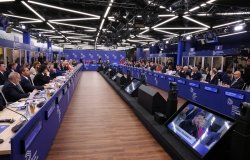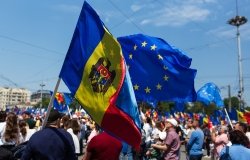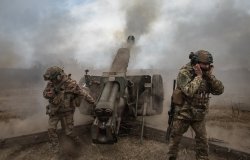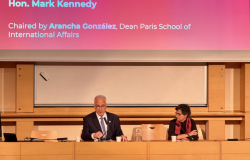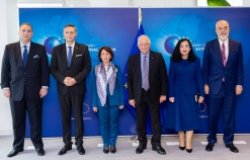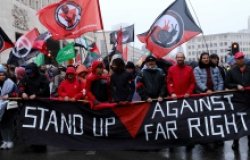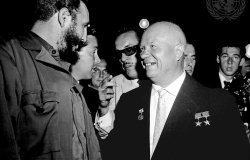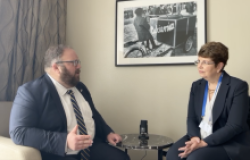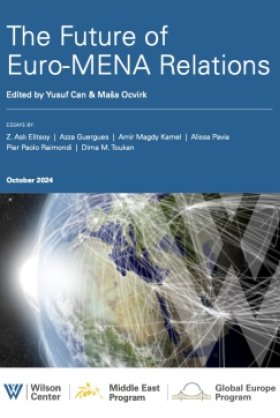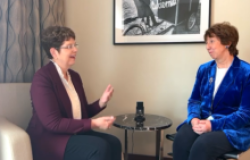257. Milosevic and the Hague War Crimes Tribunal
The trial in the Hague of former Serb dictator Slobodan Milosevic marks a pivotal moment and is likely to be seen as such in history. It does not only have ramifications for Milosevic himself and for Serbia, but also for efforts to internationalize justice in this globalized, 21st century world. This is a world in which the United States has become the dominant power, as demonstrated by its military reach and its war on terrorism.
The Hague trial of Milosevic has exposed serious flaws in the fledgling efforts to impose international justice. These weak points were not anticipated back in 1993, when the U.N. Security Council set up the court to try war crimes committed in the former Yugoslavia.
The court was designed to have weight and judicial force. It has a staff of over 1,000 people from 74 countries, and an annual budget of about one hundred million dollars. The chief prosecutor, Carla del Ponte, is a tough Swiss national with experience prosecuting the Italian Mafia - so successful that the Mafia is said to have a contract out on her life. Milosevic is charged with 66 counts of war crimes, including genocide. The trial, which could last up to two years, got underway in February 2002.
Anyone with the slightest acquaintance with the methods Milosevic used to rule the Serbs for 13 years, however, could have guessed in advance that he would make trouble. And he has. He has never been a man to submit easily to the will, or laws, of others. And he takes great delight in toying with others. That may seem a hard thing for a defendant to do. But he has managed. Acting as his own lawyer, he sees his trial as a venue to wage a fifth, psychological, Balkan war. He has been surprisingly successful. He has engaged in polemics, farce and intimidation with, at times, brilliance.
This was evident right from the beginning. Everyone remembers the start of the trial in February - it made a big international splash. A defiant Milosevic jabbing his finger in the air and blaming NATO for the "real" war crimes: the accidental deaths of Serbs in Kosovo during its 1999 bombing campaign.
"This accusation is a terrible fabrication and manipulation," was what he said as he glared at the presiding judge, Richard May. "They want to ascribe to me crimes that they perpetrated themselves, and this is an outrage to the whole Serbian people and an insult to a whole nation." His marathon opening statement was ten hours long. His intention was quite clear: he wanted to make it a trial of the whole Serbian people. Milosevic wanted to continue the wars he stirred in the 1990s in the name of Serbs, whom he has cast as the victims of foreign enemies for centuries and who had been denied the Greater Serbia they deserve. NATO was just the latest enemy in a long string of others.
In those subsequent early days, Milosevic hectored and intimidated witnesses ranging from an Albanian politician to a farmer. International interest did fade after the initial shock. It has picked up a little in recent days. Many of you may have read, or seen, reports of Milosevic sparring with the Albanian leader Ibrahim Rugova. But mostly, the occasional TV shots or newspaper stories have been swamped by America's war on terrorism. Milosevic's antics register, at least here, as little more than minor news - the distasteful ravings of the bad and defeated dictator.
Back in the former Yugoslavia, it is a different story. The footage from the Hague plays continuously, like an ongoing soap opera. It has become the equivalent of vicious and malicious feuding transferred from the battlefield to the courtroom. Milosevic and Rugova were like two Shakespearean characters, refusing to look each other in the eye as they angrily gave their versions of whether Rugova was arrested by Serb forces or whether he begged Milosevic to save him and his family.
Though the judges have begun interrupting Milosevic more and refusing him many of his questions, it is quite clear that they have often been at a loss to figure out how to allow him to act as his own lawyer while curbing inappropriate political polemics and intimidation tactics.
There are serious questions to be asked here about what exactly this process is achieving. One question involves the impact back in Serbia. Reports from Serbia suggest a widespread ambivalence at best about the soap opera, which many view as a trial by outsiders taking place far away. Informal polls suggest that though more than 80 percent of Serbs want Milosevic tried, they want him tried at home for crimes committed against Serbia and his own people. More than a few believe the trial is little more than victors' justice carried out by NATO - the organization that bombed Serbia in 1999, provoking much bitterness.
The detailed information about massacres emerging at the trial - of rape, murder and torture - have also deepened anti-Serb hatred among Moslems, Croats and Albanians. When the UN Security Council, with American backing, first set up the court, one aim was to help Serbs face up to their history and what was done in their name. Instead, it has become the opposite - and most certainly not the truth and reconciliation process set up in South Africa by Nelson Mandela.
Problems are emerging, too, about the process itself. Any judicial system takes time to build up a body of precedent, practice and case law. Even the most ardent supporters of the Hague process acknowledge that it is a work in progress. The trial of the Nazis at Nuremberg was very different in many aspects, of which I will not go into here. And the only other tribunal - looking at crimes committed in Rwanda - is facing its own difficulties.
One major problem involves evidence. Milosevic is a leader who always took care not to leave a paper trail. He usually issued verbal orders in one-on-one sessions. There has, as yet, been no direct evidence linking him to any of the crimes of which he is accused. The court contends it need only establish "command responsibility," which was clear because he was the Serb leader. Still, Milosevic's arguments that he did not have direct knowledge of atrocities can sow reasonable doubt, especially to supporters. Certainly, taped intercepts made by U.S., British, Croat or other military intelligence could be effective. But Milosevic could make another "reasonable doubt" case that the tapes were doctored.
It remains to be seen if live witnesses - the most convincing - will come forward. Most of the men with the "goods" on Milosevic were assassinated or disappeared in an apparently systematic campaign while he was still in power. Those with the most evidence were gunned down - the warlord known as Arkan, whose forces carried out much of the ethnic cleansing in Croatia and elsewhere, for example, or former police minister Pavle Bulatovic and deputy police minister Radovan Stojicic-Badza.
The latest suspects from Serbia now surrendering, or being sent, to the Hague may have evidence. One possibility, too, is that the former Bosnian Serb leader Biljana Plavsic, also going on trial, may provide testimony. Still, there are many reasons why these individuals would not testify. They, too, might see the court as an illegitimate tool of NATO. Perhaps the most daunting obstacle is that they would have to face Milosevic as inquisitor. He plays dirty, as they have seen - and he is certain to know their own secrets, given that he delighted in getting his secret police to find ammunition to blackmail allies and opponents alike. Quite apart from the legal difficulties, the court has other problems that have hampered its work: it does not have its own police and it is reliant on the help of member nations for arrests. Furthermore, the judges and prosecutors tend to be unfamiliar with the countries and cultures of defendants. These obstacles may yet be overcome. The trial does have up to two years to go. But the first few months have been shaky at best.
Issues also arise beyond the immediate trial. The U.S. government has not said so directly, but the court has influenced the atmosphere in which the United States has backed away from the idea of a structured international court of justice it once supported. When the Hague tribunal was set up for the former Yugoslavia (as for Rwanda), it was with the enthusiastic backing and financial support of the United States. The court was seen as a way to establish a precedent for trying other leaders, such as Saddam Hussein, who might otherwise escape justice. It was also seen as a threat to wield for curbing bad behavior. The Bush administration has, however, distanced itself from the Milosevic trial in particular, and the Hague court in general. In part, this is to break with the policies of the Clinton administration. But there is more to it. The problems I have outlined have added to American misgivings about the International Criminal Court (ICC), founded in Rome in 1998 and set to start operations July 1.
In May, the Bush administration nullified the U.S. signature on the Rome treaty. The House of Representatives has passed a resolution barring cooperation with the ICC. The primary American complaint is that it could turn into an anti-American forum, with U.S. peacekeepers and soldiers - even top officials like the secretary of defense - brought to trial on flimsy charges. The example of the Milosevic trial has emphasized for America the ways in which such courts can be exploited and manipulated. The United States has already struggled with the question of international standards of justice with its contortions over how to handle Taliban and al-Qaeda prisoners at Guantanamo Bay. It now faces wide international condemnation for its about-face on a permanent international court. European and NATO allies in particular, are pointing out that without the United States, the court will have trouble gaining force and respect. This is expected even though 60 nations, as required, have ratified the treaty creating the ICC. The European press has presented this episode as another example of America becoming a bullying unilateralist that wants other countries to cooperate in its own war on terrorism but which will not take part in anything it does not control. The ICC creators did go out of their way to answer America's main fears that U.S. soldiers on peacekeeping duties could be frivolously accused of war crimes. Or that senior U.S. officials could face charges brought by any number of America-haters, from Moammar Qaddafi to Fidel Castro among others. The court will only, for example, try cases that cannot be dealt with by the defendant's own country. But it refused to allow the Bush administration a blanket exemption for Americans, even though the president could revoke that exemption.
I believe that the United States should address the questions of international justice in a world in which it is the single superpower militarily engaged in the war on terrorism. There are several ways it could do this.
The respected Economist magazine recently argued that the Bush administration should set aside its doubts, join the ICC and work from within. The foreign secretary of America's closest ally, Britain, made the same argument during his visit to the US. Human rights groups in the United States, including Amnesty International, have also strongly urged Washington to join the court.
There may be other ways, too, to foster international justice in a pragmatic way that avoids American fears - and, in the process, stands more chance of bringing reconciliation in the countries concerned, like the former Yugoslavia. One idea may be to look at something that has been successful, such as the International Monetary Fund (IMF). It has created tools and prescriptions for overhauling economies. Perhaps a judicial version of the IMF might work. It could have the kind of financial strings attached that have proven successful in, for example, persuading governments in the former Yugoslavia to send suspected war criminals to the Hague. Its prescriptions could involve international and local judges and lawyers.
The point is that the United States needs to take the lead in what is an important part of winning the peace, as well as the war on terrorism. The Milosevic trial should provide lessons for producing solutions that would work, not a reason to retreat.
Louise Branson spoke at an EES Noon Discussion on May 15, 2002. The above is an edited version of her presentation. Meeting Report #257.
About the Author
Louise Branson
Read More
Global Europe Program
The Global Europe Program is focused on Europe’s capabilities, and how it engages on critical global issues. We investigate European approaches to critical global issues. We examine Europe’s relations with Russia and Eurasia, China and the Indo-Pacific, the Middle East and Africa. Our initiatives include “Ukraine in Europe” – an examination of what it will take to make Ukraine’s European future a reality. But we also examine the role of NATO, the European Union and the OSCE, Europe’s energy security, transatlantic trade disputes, and challenges to democracy. The Global Europe Program’s staff, scholars-in-residence, and Global Fellows participate in seminars, policy study groups, and international conferences to provide analytical recommendations to policy makers and the media. Read more
